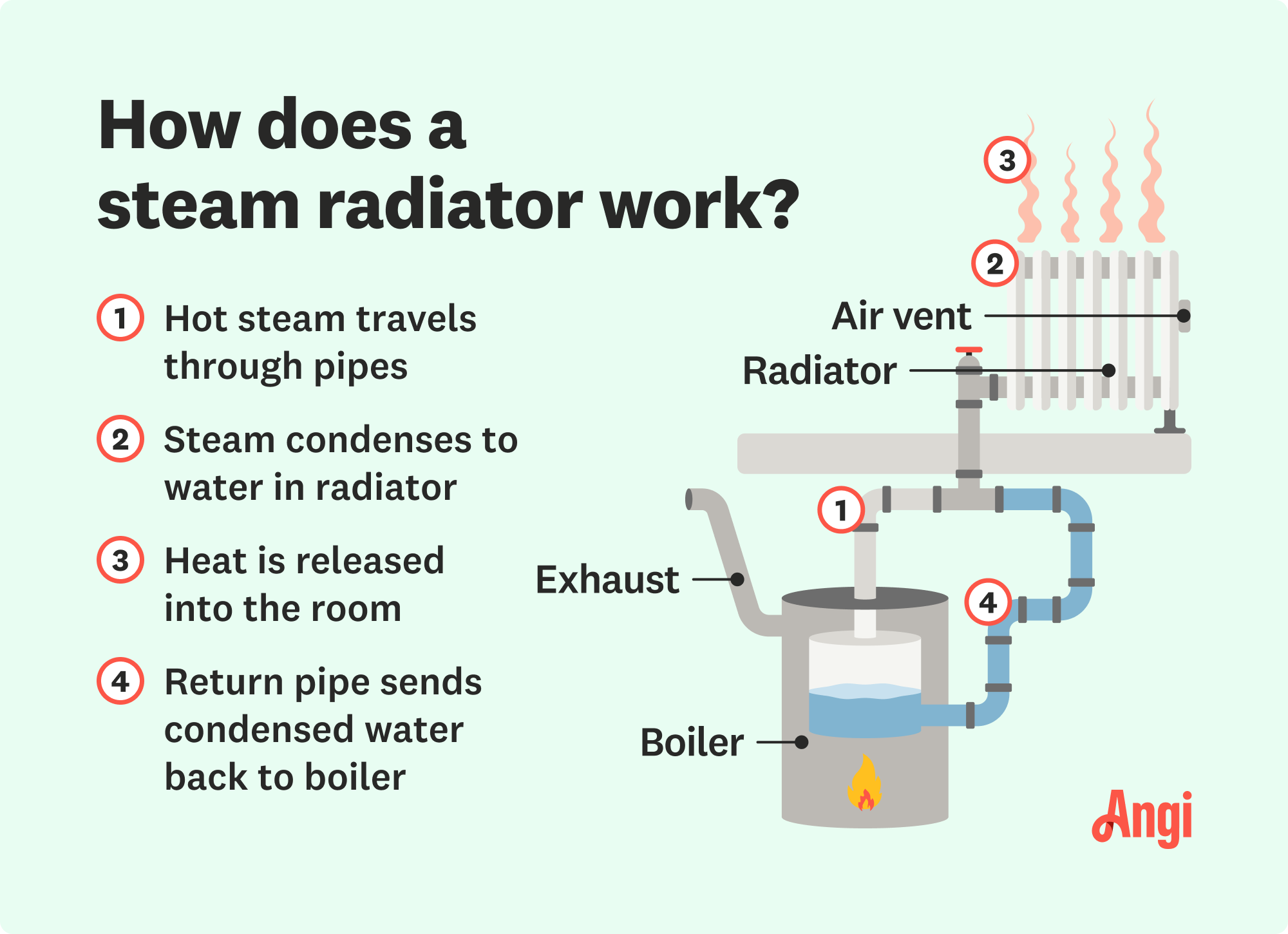How Much Does Home Radiator Repair Cost? [2025 Data]
Radiator repair costs $350 on average, but pricing often ranges from $100 to $500 based on the radiator type, material, and issue.


Radiator repair costs can range from $5 for simple DIY fixes to $600 for major issues, but most people pay around $350. If your radiator has seen better days, keep reading to get a good idea of how much you’ll pay to bring the warmth back to your home.
Cost to Repair a Radiator by Issue
Radiators typically require some form of maintenance at least once a year, even if it is something as simple as bleeding or balancing your heating system. Larger issues, such as a broken valve, rust buildup, or cracked pipes typically only occur after several years.
Here are the average prices of the most common repairs and reasons for a heating service call. Repairs such as fixing a leak significantly range depending on the extent of the issue and where the leak is located.
| Repair Type | Average Cost |
|---|---|
| Bleed a radiator | $100–$200 |
| Address a banging sound | $100–$200 |
| Balance a radiator | $100–$250 |
| Remove rust | $150–$300 |
| Radiator insulation | $150–$300 |
| Regulate high pressure | $150–$400 |
| Fix a crack | $200–$400 |
| Unclog a radiator | $200–$450 |
| Fix a leak | $150–$600 |
As a homeowner, it's your job to keep an eye on changes in your radiator and heating system. Most frequently, radiators either do not heat up or they produce too much heat. On average, both issues cost between $100 and $400 to repair, depending on the source of the problem.
Heating specialists and plumbers will charge a base service fee of about $100 to come to your home and diagnose the issue. Beyond this, they will charge either an hourly rate plus the cost of parts or a base fee for the whole repair.
Cost of Radiator Repair Replacement Parts
In some cases, your radiator may be underheating or overheating your home because of a broken part. For example, a defunct thermostat may cause a radiator to stay on longer than necessary. These price ranges include both parts and the cost of labor.
| Replacement Parts | Average Cost |
|---|---|
| Air vent | $150–$300 |
| Valve | $150–$300 |
| Thermostat | $150–$400 |
| Radiator pipe | $200–$600 |
Radiator Repair Costs by Type and Material

The three most common radiators are electric, steam, and hot water. While electric radiators simply push a heated thermal fluid through their system, steam and hot water radiators depend on a full system of pipes to transfer hot air or water to heat your home. These heaters have more complex parts from a longer timeframe going back in heating history. More parts mean more repairs—some of which can be trickier to find than others.
| Radiator Type | Average Cost |
|---|---|
| Electric | $125–$450 |
| Steam | $175–$600 |
| Hot water | $150–$500 |
Radiators also come in stainless steel or cast iron, and cast iron parts cost a bit higher on average to repair and replace.
| Radiator Material | Average Cost |
|---|---|
| Stainless steel | $150–$550 |
| Cast iron | $200–$600 |
Radiator Repair Cost Breakdown
A trustworthy plumber or HVAC specialist will always provide an estimate before completing repairs on your radiator. The breakdown may include an inspection fee, additional hourly or a set-rate labor fee, and the cost of parts.
| Radiator Repairs | Average Cost |
|---|---|
| Inspection or base service fee | $100–$200 |
| Base fee or hourly rate | $100–$250 per hour |
| Replacement parts | $150–$600 |
Cost to Install It Yourself vs. Hiring a Contractor
Installing a radiator is complex work, so it's important to hire a professional HVAC technician for most unknown diagnoses and repairs. However, as you get to know your radiators, you will be able to tell when standard maintenance will do the trick.
The cost of small repairs—such as bleeding or balancing your radiator—will cost between $5 and $50, whereas hiring a professional will cost an average of $350. While taking the DIY approach will save money, only perform basic repairs like these to keep your home and heating system safe.
Tips to Save on Radiator Repair Costs
Radiators are one of those appliances that naturally develop wear and tear over time. However, keeping an eye on the appearance and performance of your radiator can help lower costs. For example, if you spot rust around your radiator, you could have a condensation problem. Catching this early and calling in a local boiler repair person means there's less of a chance of having to replace parts entirely.
You can also sign up for HVAC maintenance service contracts that keep an eye on your radiators for you. These contracts cost between $150 and $500 per year.
In the unique case that your radiator suffered damage from sudden damage, such as fire, an unexpected freeze, or a fallen tree, your home insurance may cover the costs.
How Angi Gets Its Cost Data
Home is the most important place on earth, which is why Angi has helped more than 150 million homeowners transform their houses into homes they adore. To help homeowners with their next project, Angi provides readers with the most accurate cost data and upholds strict editorial standards. We extensively research project costs to develop the pricing data you see, so you can make the best decisions for you and your home. We rely on reputable sources, including the U.S. Bureau of Labor Statistics, academic journals, market studies, and interviews with industry experts—all to ensure our prices reflect real-world projects.
Want to help us improve our cost data? Send us a recent project quote to costquotes@angi.com. Quotes and personal information will not be shared publicly.
Frequently Asked Questions
A heating expert will be able to clarify whether it's worth the cost of replacing your radiator based on the cost of repairs. Between parts and labor, you'll pay between $250 and $2,500 for a new radiator depending on the type of unit. If the long-term costs of fixing a radiator are higher than replacement, it's best to update your model.
Addressing banging, clanging, and hissing radiators involves several steps. Start by bleeding the radiator to release trapped air, a common source of noise. Next, ensure all valves, brackets, and pipes are securely tightened to prevent the components from rattling. You can also consider installing radiator insulation to dampen heat expansion sounds. If you perform all of these fixes and the noise persists, explore the use of radiator additives that can mitigate water-related noises. If all else fails, you should consult an HVAC professional.
The life expectancy of home radiators ranges from 15 to 30 years. If you properly maintain your radiator, including getting it serviced regularly, you can expect yours to last longer. People who live in very cold climates (where you need to use the radiator a lot more) or people who forget regular maintenance might not get as much life out of their radiators.





- Furnace Repair
- Air Conditioning Repair
- HVAC Repairs
- Furnace Installation
- Wood & Pellet Stove Repair
- Dehumidifier & Humidifier Repair
- Heat Pump Companies
- Swamp Cooler Repair
- Wood Stove Services
- HVAC Companies
- Commercial A/C Repair
- Geothermal Installation
- Air Conditioning Installation
- Boiler Repair
- 24 Hour Furnace Repair
- Geothermal Repair
- Heat Pump Repair
- Humidifier Installation
- Thermostat Repair
- Thermostat Installation
- Nest Installation
- Heating & Cooling
- Heating Repair
- Furnace Cleaning
- Furnace Tune-Up
- HVAC Technicians
- Subcontractors
- Furnace Maintenance
- Plumbing & Heating Companies
- Wood Stove Inspection
- Mini Split Installation
- Wall Heater Repair
- Duct Installers










